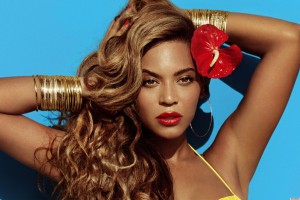Why Almost Everyone Loves "Bowing Down" To Beyoncé
posted in: Features • Pop
 To be clear, this is not really about Beyoncé’s new album. It’s not about her incorporation of Chimamanda Ngozi Adichie‘s feminist TED Talk on the track “Flawless.” It’s not about her anti-marketing strategy. And it’s definitely not about judging whether the music is overrated or not.
To be clear, this is not really about Beyoncé’s new album. It’s not about her incorporation of Chimamanda Ngozi Adichie‘s feminist TED Talk on the track “Flawless.” It’s not about her anti-marketing strategy. And it’s definitely not about judging whether the music is overrated or not.
Because beyond any of the numerous aspects of the album’s production that Beyoncé had under her control “ the probably insane non-disclosure agreements regarding the album’s release, the video treatments, the feminist lyrics, the genre-spanning production “ what is just as fascinating about the new album are Beyoncé’s fans reactions to it, and the repeated hyperbole that they use when they talk about her, especially in contrast to their own lives.
It isn’t news to anybody that Beyoncé’s fans elevate her to the level of royalty, and, most of the time, to the level of a goddess. It’s become just as commonplace for the casual fan to refer to Beyoncé as “Queen Bey” as it has for some of the press’ most respected music critics. But if you comb through enough tweets and status updates about Beyoncé, you’ll see another interesting trend: that, in their veneration, her fans repeatedly tend to openly highlight their own supposed personal insignificance and lack of achievement to the pop queen’s grandiose accomplishments.
Here are some anonymous Beyoncé-related samples from the recent Twitter archives:
“I can barely make my bed in the morning. @beyonce is on a world tour and puts out an album and a shit ton of videos. what am i doing?”
“Beyoncé made more money in the past hour than I have in my whole life.”
“I don’t want to sound like a crazy stan, but listening to Beyonce’s new album is why we were put on this earth”
“Let it sink in that 2-year-old Blue Ivy Carter already has a verse on a Beyonce song, once again proving she is more powerful than us all.”
A recent Buzzfeed review of Beyonce’s new album takes a cursory stab at dissecting this phenomenon: Even casual fans approach her as a sort of deity, in large part because thinking of her as a superhuman being is part of what makes her music and performances so much fun.”
As an explanation, this only covers half of the phenomenon; going out of the way to portray oneself as servile, incompetent, and generally inadequate doesn’t really align with the idea of what most people would consider “fun.” Still, it does address why people gravitate towards Beyoncé in the first place: she is indisputably one of the most powerful performers in the pop world, if not the most powerful; and her album sales, fan following, raw talent, and performance ability dwarf those of almost every other mainstream pop artist. Fans love her music, but they also love her success. They aspire to be like her, but know that they’re nowhere near her level. Beyoncé’s music is empowering, but it’s also intimidating. She is so successful, so rich, so famous, and has her entire show and persona so locked down that it’s almost difficult to completely identify with her.
What a negative comparison does accomplish, then, is to provide a way for fans to associate themselves with Beyoncé’s greatness, even if it is only in an inverse formulation. After all, negatively defining yourself against something still links you to the very thing you’re defining yourself in contrast to, simply by association. And the cultish denigration of their own lives Beyonce’s fans engage in may just constitute a roundabout way for them to connect themselves to Queen Bey’s own monumental success. From this angle, what initially seems like self-castigation might actually read as empowerment, because in the face of Beyonce’s chart-conquering albums and all-around pop music domination “ feats that feel daunting to even hope to aspire to “ it’s almost all that fans can do to connect with her and derive power from her immense success by showing how mundane their lives are by comparison.
And yes, Scrooge, this self-deprecation is most of the time just an egotistical attention grab from people whose names will, in all likelihood, never, ever be mentioned in the same breath as Beyoncé’s. Sure these negative comparisons are just a way for people to ride the tailcoats of the world’s most successful pop megastar and garner a few more retweets, followers, and page views. And of course, this gets increasingly annoying and insufferable the more you think about it. But honestly, we’ve got more important things to worry about here. Like preparing for Blue Ivy’s imminent, entirely baby-talk solo album. Just picture the tweets about that.
Follow Mikel on Twitter @Dream_Arcade
More like this:
Lana Del Rey Stole Half An Hour Of My Life And I Will Never Get It Back
Why Miley Cyrus’ ˜Bangerz’ Tour Might Be The Most Important Tour Of The New Year
Why Kanye’s ˜Bound 2² Video Could Have Been Great (And How Franco And Rogan Get It Right)
